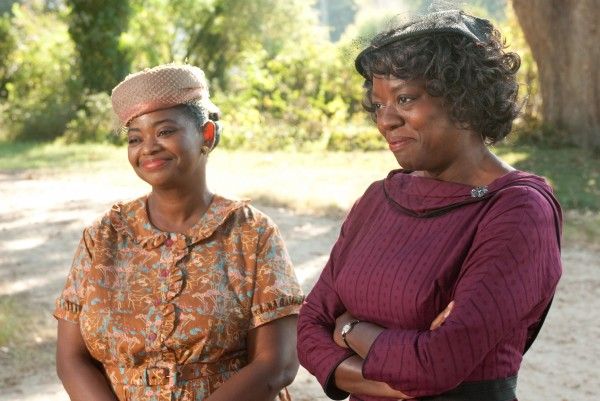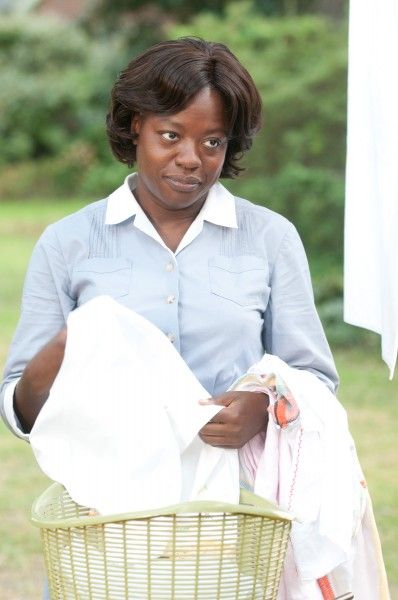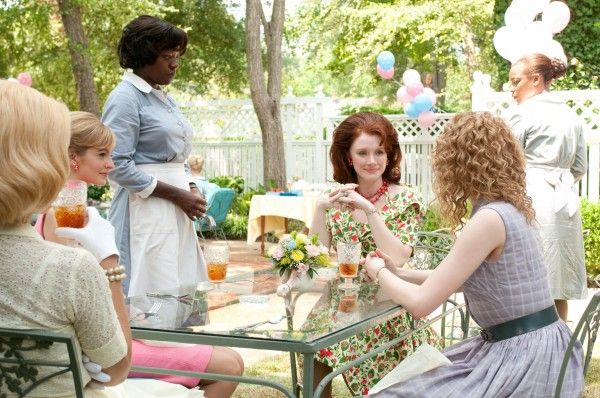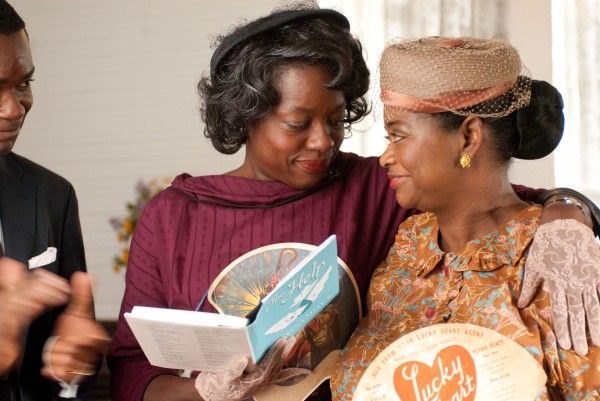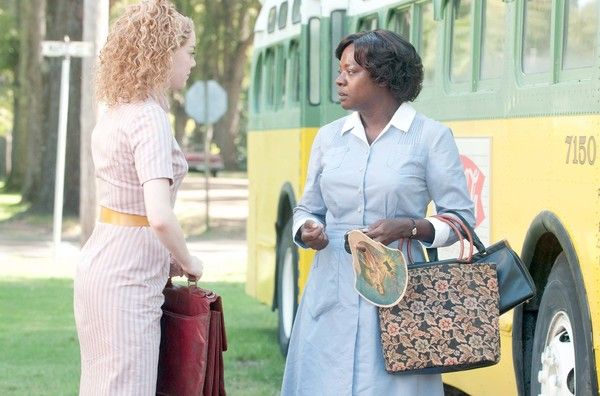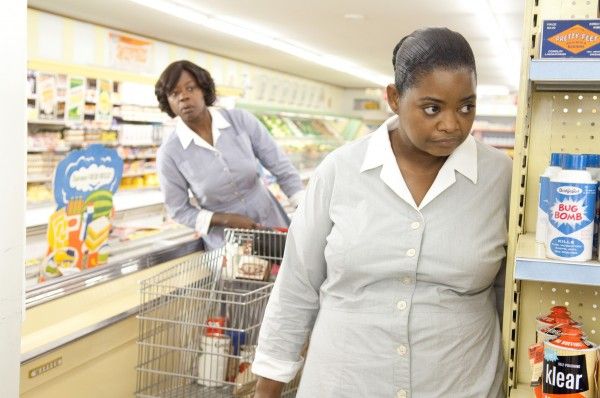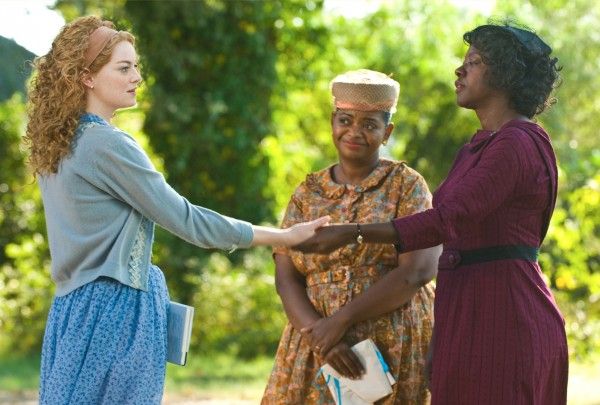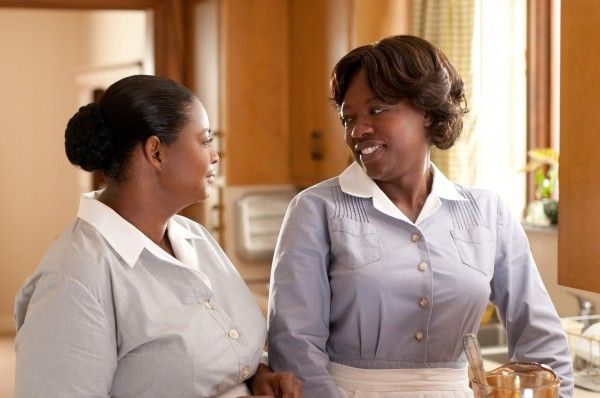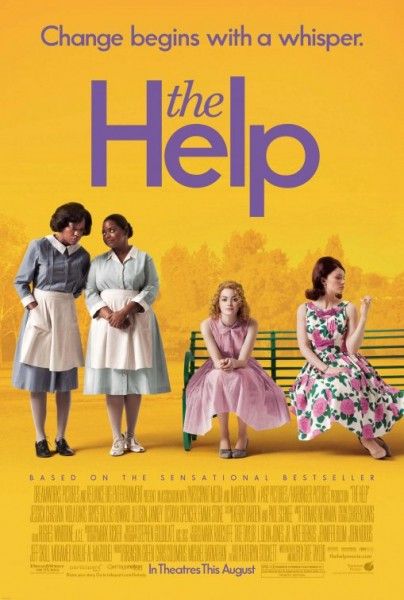In The Help, adapted from the best-selling novel of the same name, actress Viola Davis gives an acclaim-worthy performance as Aibileen Clark, a life-long housekeeper in Jackson, Mississippi during the 1960s, who forms an unlikely friendship with Eugenia “Skeeter” Phelan (Emma Stone). Bonding over a secret writing project that breaks societal rules in a way that was unheard of at that time, Aibileen finds herself opening up and telling her stories about raising 17 children for her white employers, often at the neglect of her own son, who was tragically and unnecessarily killed in an accident. While a sisterhood emerges from the alliance between Skeeter and Aibileen, it gives many other maids the courage to share their own experiences, at a time when speaking out put them all at risk.
At the press day for the film, Viola Davis spoke to Collider for this exclusive interview, in which she talked about what a dream it was to play such a multi-faceted character, how difficult it was to live up to not only the expectations of the fans of this book but also herself, how she wanted to make sure every detail of her character was real and authentic, the challenges of making sure audiences could relate to someone who is a quiet and internal character, how she hasn’t taken a break since her Academy Award nomination for Doubt because she wants to keep riding the wave while the work is available, and that she would love to be able to do a grand, sweeping period piece. Check out what she had to say after the jump:
Question: How did you get involved with The Help?
VIOLA DAVIS: I was just about to go into (the Broadway play) Fences, and they said they were going to shoot this movie at the same time, and I was like, “Damn, this is the best role for an African American and I’m going to miss it!” But, (screenwriter/director) Tate Taylor said he’d really envisioned me in the role and it just happened to work out. They started filming literally the day after Fences closed, on July 11th. When I read the book, I said, “I’m going to option it. There are all the roles for black actresses.” I don’t know what I was thinking.
You gave such a beautiful performance in this film.
DAVIS: Thank you!
Is it a dream for you, as an actor, to be able to make an audience laugh and cry, and experience anger and hope, all in one performance?
DAVIS: I’m so glad you said that! It’s a dream to be able to just play a multi-faceted character. I always say that, like a scientist or anyone, you always want to be the problem-solver. You feel like, if you solve the greatest mystery or the greatest problem, then that makes you brilliant. It’s the same thing with an actress. You want to be able to really tackle a character and make it a fully-dimensional human being who is complicated, funny and all the things that a person could be. If you can achieve that, you feel great. You so rarely get to do that, as an actress in general, but as a black actress, it’s almost never. You’re in two or three scenes, and you maybe have a funny bit, here or there, or you might be sassy and strong or cuss somebody out, and then you’re gone. You don’t really even need a name. But, this was a chance for me to go on a journey. It’s fantastic. This is why I want to school. I went to school to do this.
Was it daunting to live up to the expectations of all the people who read and love this book?
DAVIS: Absolutely! It was very, very difficult. The people who have read the book, the people who haven’t read the book, African American audiences, the people who were maids in the past, the people who grew up with these maids, all had a personal investment in this book, so you would go to work trying to meet everybody’s needs. I’d be in the make-up chair going, “I can’t do that. I can’t do that ‘cause that will insult that person.” And then, ultimately, what you found was that the expectation that was the most important was yourself. What your standard was, of how you wanted to communicate this character, was the only thing that was left standing. Everything else had to be thrown out the window because you can’t satisfy everyone. Ultimately, it’s not your job, as an actress, to satisfy people’s expectations or image of who you should be. Even in your life, you are just who you are. So, you had to throw that out. It was just too much. You wouldn’t speak, if that were the case. I would have lost 50 pounds as Aibileen. Especially with the African American audience, I really felt a huge responsibility there, but I had to shut it off.
Do you feel like this is a family film that shows how adversity really is what makes us who we are and shows us who we don’t want to be?
DAVIS: Oh, absolutely! The Civil Rights movement is almost a backdrop, but a strong one because it informs the relationships of these women, and yet they were able to overcome it because they had a common goal, which was this book. Through this task, what it created was a bond of commonality. I think it’s really, really interesting that Skeeter and Aibileen are the first to meet, and you recognize Skeeter as a modern woman, but so is Aibileen. Aibileen understands that, if she tells this young girl, Mae Mobley, from the time she’s a baby, that she is smart, she is kind and she is important, when she grows up, she’s going to have a sense of herself that is so strong because somebody told her and taught her to do that. Aibileen knows that, even though she’s grieving for her son and she’s lost her purpose, she has a higher purpose. She is a writer, and she recognizes that. She knows she has a gift and has talent, so therefore she’s going to step away from what she knows, which is really difficult for people, and walk into the unknown. That’s extraordinarily liberating and extraordinarily courage.
Was it challenging to make this character feel so authentic with the wardrobe and hair, instead of having her come across as an actor who is just playing dress-up?
DAVIS: Yeah, it’s challenging to find it and not make it into a caricature. Some things I fought for and I lost, some things I fought for and I won. One of the things that I wanted to create, even in the hair, was that every small detail was to show what she does to put on that wig every day. Black women wear wigs, and we wore wigs then. That’s just what we do. We have a hair issue. But, I wanted to do it subtley. You have the image of her in the bathtub with her corn rows, and then she has her wig on in the next shot. That’s what she does before she goes to work. She puts her wig on. How she looks when she is in a room full of white women is very important to her. I thought about all the details, even in the way she dresses when she goes to work and the way she reacts when Skeeter comes in the house. That was very difficult for Aibileen. She’s never had a white person in the house, so she’s serving her. All of that comes from doing your work, as an actress. Your job is to make it authentic and make it connected to something very human. It’s what you have to do.
Because your character is much more reserved and emotionally conflicted, was it also difficult to find a balance, so that audiences could connect to her?
DAVIS: It was very difficult, yeah. It’s very, very hard to play a quiet character. It really is. We always get the shit end of the stick. You just do. Flashy characters are more entertaining to people because you get it. You don’t have to work to get someone who says what they mean and says what they think. They’re out there. It’s harder to play a quiet character because everything happens in their stream of consciousness. They’re thinking and feeling the world, but they’re saying very little, so then you have to communicate it through your behavior. But, at the same time, how we feel and how it shows through your eyes is a beautiful thing on film. Meryl Streep is a perfect example of that. But, what’s difficult about it is trying not to get into another character’s lane, when you’re playing that kind of character. You don’t get the pay-off when you’re playing a quiet character, so sometimes you want to just throw out all your work and say, “Okay, let me do something really funny or gimmicky, just so that I can get some attention in this scene.” You’ll do something really flashy that has nothing to do with the character because you’re just so afraid to be quiet and still, and you’re afraid not to get the reaction from the audience. That’s really, really difficult. You have to keep in character and know that the pay-off is that, when you string it altogether, what you see is a total human being. In the end, that’s why I go to the movies and that’s why I go to the theater. I want to see a human being. I don’t want to just be entertained. I want to be entertained by recognizing that person as someone that I know and someone who is multi-faceted. That’s why I went to school, to build a character.
What was it like to balance that quiet performance with Emma Stone and Octavia Spencer, whose personalities are so strong in the film? Was it fun to get to play with them?
DAVIS: Absolutely! It’s really fun to play that juxtaposition. What’s so beautiful about the movie is taht everyone is different. No characters are the same. Even though you have a lot of redheads in the movie, there’s no character that’s the same, and that’s just the way it is in life. And, each character balances the other character. Minny balances Aibileen out because she keeps her light and she saves her from caving into her grief. And, Aibileen keeps Minny believing that there’s something more to her life, other than Leroy, and that she deserves more and she’s worth more. That’s the beautiful thing about relationships. That’s what you miss in movies so much. Even in theater, people are not so much into creating characters anymore. They’re so much into just setting up gimmicks, and then we go from one scene to the next, and we’re entertained by these gimmicks, and we never question the human values of any of the characters. What’s so great in this is that you see all these different human beings and their lives collide together, and they create such beautiful and seamless relationships, in the end. You don’t see it coming. You see it as something forbidden and scandalous, but ultimately, in the end, it’s something quite beautiful. People who are alone all the time never grow. Those hermits just stay the same. It’s only through relationships. Relationships change us and make us grow. That’s what you see in this film.
How did you develop the chemistry that sustained itself through the movie?
DAVIS: We all loved each other. Everyone is different. I don’t want to sound cynical or anti-social, but I don’t have to do all that preparation. I’m not getting enough sleep, as it is. I don’t want to go out with you for five hours a day, to get to know you, so that it can show up on screen. I can’t be that method. I think I got acting training, so I can just fake it. We have lives.
How was it to work with Tate Taylor, who was so passionate about this project?
DAVIS: First of all, Tate is the best collaborator. He’s not just a dictator. He’s a great collaborator, but an intelligent one. He doesn’t just take an idea from you, if he doesn’t think it’s going to work. Tate’s best asset, in my opinion, is his passionate integrity. It probably comes from growing up in the South and being new to it all. He really fights for what he believes in. He doesn’t go with the crowd, and I think that’s why he was able to create such a beautiful piece of work. He fought for Octavia in this role. They could have easily given it to some star, but Octavia is his friend and she’s an actress that he really admired, and he fought for her. Not a lot of people would do that. He said, “You get her and me. We’re a package.” Who does that?
Did the Academy Award nomination you got for Doubt change the scripts and offers you got?
DAVIS: Yeah, Doubt really changed the course of my career. I’m busy. I get wonderful offers. I have no complaints. Well, yeah, I do have complaints. I don’t get enough sleep. That’s my complaint. I need some sleep! I have to tell you, the only thing an Oscar nomination gives you is more stress. People have a whole different set of expectations for you because that Oscar nomination precedes you in the room. The worst thing is to operate from a point of view of fear, and you always have this fear in you that you’re going to be found out, and that this is going to be the movie that’s going to absolutely break your career and people are going to say you suck. It doesn’t get easier because you have all that going on in your head and you have to shut it off. You’ve just gotta dive in there. And, it’s always hard to be private in public, which is what acting is because you have to do thing really emotionally naked. Even in my life, I’m not a big emotionally naked person. I’m just not. I’m not a big crier. So, it’s interesting that I get these roles. But, no, it doesn’t get easier.
Why haven’t you taken a break from work at all?
DAVIS: Because I’m crazy. I’m insane. I don’t know. I don’t have an answer for that one. You absolutely feel, as a black actress, that you’ve got to ride the wave because there’s just so few roles. I hate to play that card, but it’s the truth. There’s not a lot of roles. I can be busy for three years and you may not even know what I’m busy doing because you only see me in a few scenes here or there, but I’ve been working my tail off because there’s just not a lot. Whatever you see me in is usually the biggest role for a black actress that year. I feel like I’ve gotta take it now and seize the day, or it’s going to dry up. Some people say, “Oh, that’s just a myth. It’s just going to dry up.” Yeah, it does. For some people, it will. Someone else comes up, all the time, and you have to understand that there are other really talented people. With the category that I’m in, someone could come up and totally knock me off the throne, and then there’s nothing. It’s not like you have all these great roles, and then there’s these other roles great roles that you could do. There’s nothing. That’s just what my career is. I may seemingly have the career of “Oscar nominee, character actress,” but it’s a slippery slope there, for a black actress. I’ve really been working non-stop this year. I did six days on Extremely Loud and Incredibly Close, the Stephen Daldry movie. The Help was nine weeks of work, and that’s my biggest role, in my 23-year career. It’s the biggest role I’ve ever had.
With so much that you’ve done in this amazing career that you have now, is there any kind of role that you would just love to do, if given the chance?
DAVIS: Yes! There are a lot of roles, like sci-fi and action, but I think about that and my husband is like, “You want to do an action movie, running around all day? You’ve got a bad hip and a bad back!” But, I would love to do a grand, sweeping period drama, in the vein of John Ford. I would absolutely love that! I want to do a six-part mini-series, where I’m just the protagonist on a farm somewhere. That would be my dream. I would love that. I never see women of color in period dramas like that, at the turn of the 20th century, just grand in scope. That would be cool!

